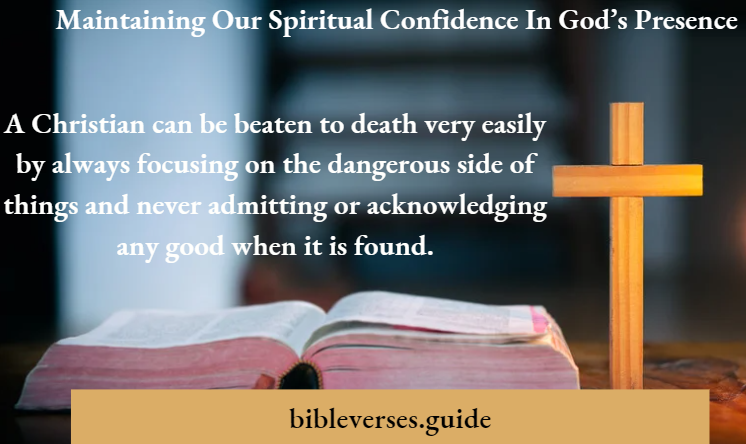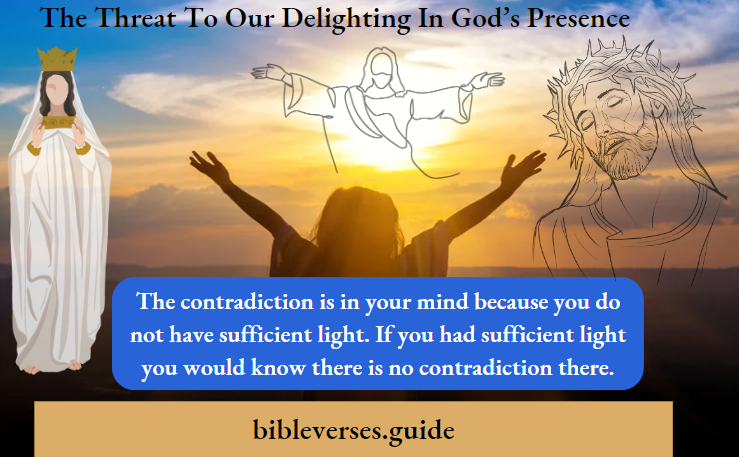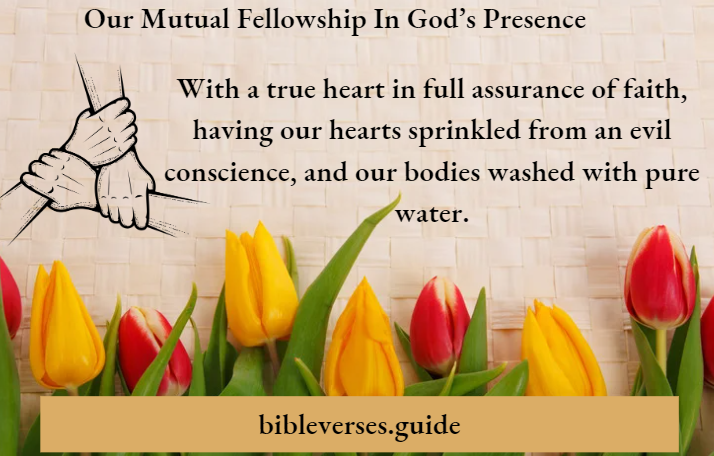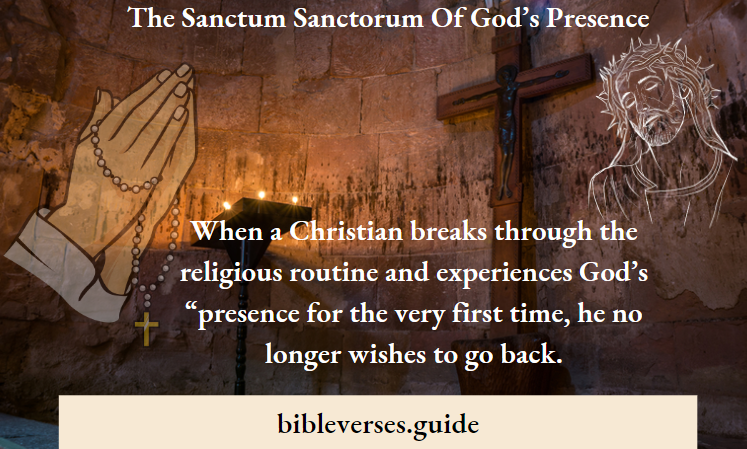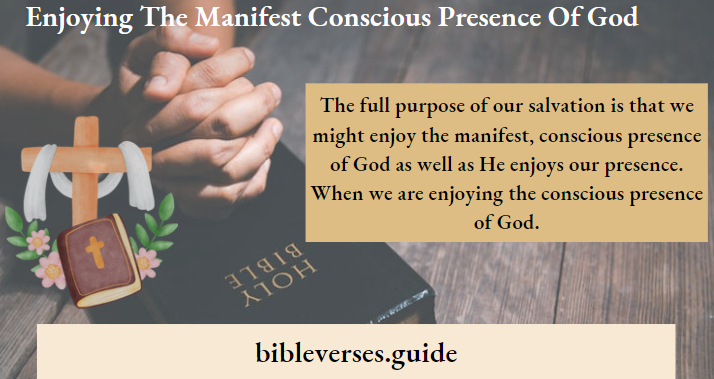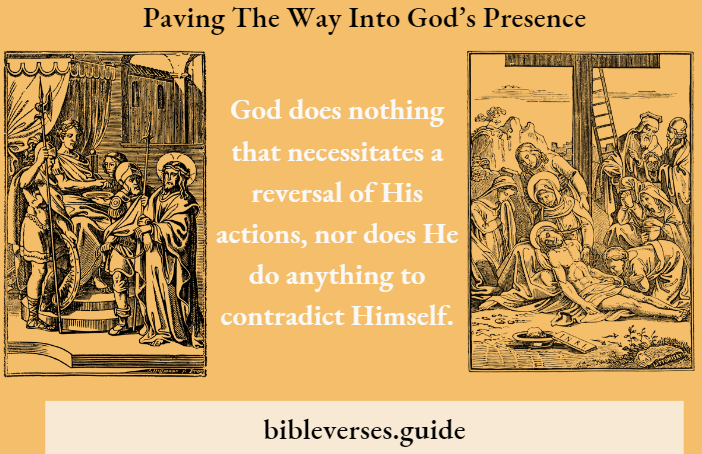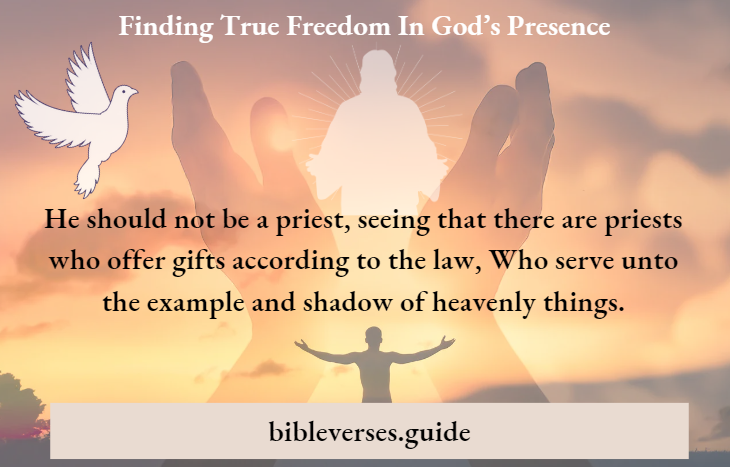The Dimensions Of God’s Presence
For if the blood of bulls and goats, and the ashes of a heifer sprinkling the unclean, sanctifieth to the purifying of the flesh: How much more shall the blood of Christ.
Who through the eternal Spirit offered himself without spot to God, purge your conscience from dead works to serve the living God?
Hebrews 9:13-14
Mark Twain famously said, “The difference between the right word and the almost right word is the difference between lightning and a lightning bug.”
Read and Learn More Bible Verses about the Presence of God
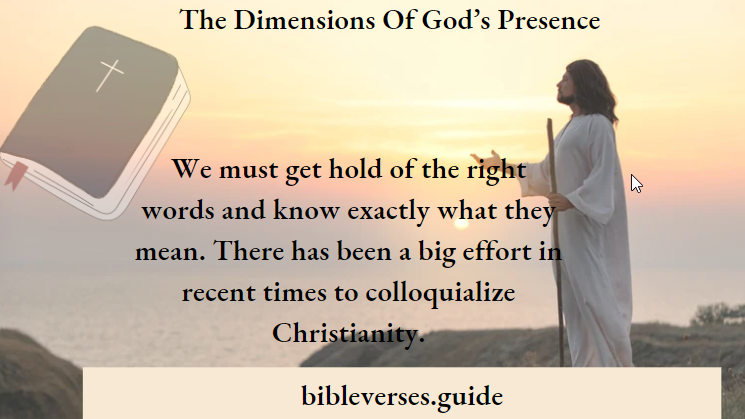
By that, I mean to get rid of all the old standard words we have used ever since English was spoken and put in their places words more familiar.
When that happens, we lose the meaning when we lose the word that contains the meaning. Scientists and doctors know that.
Dimensions Of God’s Presence
Ornithologists use a specific Latin word to designate a certain bird. I don’t know the Latin word we use to designate the bird we call “flicker.”
My father always knew it as a flicker or a wet hen, because when it began to say, ‘Wet, wet, wet, wet, wet.”
it was going to rain, which is why they called it a wet hen. Then there is a bird called the “golden-winged woodpecker.”
Presence Of God Bible Verse
Others call it a “high hole” because they go up high in the tree and dig a hole in the tree and put their nest in there.
Dimensions Of God’s Presence
So, between the flicker, the wet hen, the high hole, and the golden woodpecker, you would not know what to believe.
The ornithologist, however, designates a bird by one Latin term, which never changes. The result is, that every time any scientist or student hears that term, he knows exactly which bird it is.
I have given you only four names the flicker is known by. It could be known by a dozen or two dozen and probably is over the North American continent.
For it is found everywhere. But when you want to think accurately, you think in terms of its Latin name.
Theology is like that. If I talk about God as the “All Father” or as the “One Upstairs,” or I use some strange or private name, it may mean anything to anybody.
But if I say He is “God, the Father Almighty, maker of heaven and earth and all things visible and invisible,” and stick to that, then I know exactly what I mean.
And regardless of how many weird occult religionists try to designate God by various names, if I give Him the name that He gives Himself.
I always mean the same thing that He means. If I say “Jehovah,” I mean Jehovah. And if I say “God, the Father Almighty,” I mean God, the Father Almighty. It never changes.
Words are little pitchers, and each one is labeled. It is the business of the devil to pour out the true meaning of each little pitcher and pour in some other meaning.
Imagine what would happen at your house for breakfast if a little pitcher with the word “cream” on it got emptied and somebody put vinegar in it.
Presence Of God Bible Verse
If you reached over to the little old familiar cream pitcher that has been used for years and poured vinegar in your coffee, it would ruin the coffee, of course.
So, when we find a little theological word so familiar to the Church down the centuries.
Dimensions Of God’s Presence
And it means a certain thing, then some bright young fellow pours that meaning out, rinses it, and puts another meaning in, you do not know where you are.
You are all confused, all mixed up. So, let us stay not only by the truth but let us stay by the words that convey the truth.
Christian writers today are busy writing down to the people and making morons out of us.
Have enough gumption and intellectual verve to learn the simple language of the Bible, that when the Word says “repent” it means a certain thing; and when it says “justified.”
Theology Of Divine Presence
It means a certain thing; and when it says “born again,” it means a certain thing. Find out what it means.
It would not take you a minute and a half, and from that time on, until you die, you will know exactly what you mean when using that language.
The need for Salvation A Self-Demonstrating Truth
Let us take this step by step and notice what it says in Hebrews 9:13-14: “Christ, who through the eternal Spirit offered himself without spot to God.”
This presupposes certain truths and one of those truths is that the fall of man is a fact. This is one self-demonstrating doctrine. Not all truths are self-demonstrating.
Say you were visiting a friend you had not seen for 10 years. You heard they had a new child in the home, but you did not remember if it was a boy or a girl.
Presence Of God Bible Verse
If you looked up and saw a child about three years old and so dirty that you could not get him cleaned up.
And yelling for something to eat, slugging his way through a clean kitchen, you would not say, “Is that a girl?” You would know better.
That is a self- demonstrating male. He is demonstrating by his conduct that he is a boy.
And the worst thing in the world for that fellow would be to call him a girl. Some truths are self-demonstrating; that is, they demonstrate themselves. God says, “Man sinned and fell.”
Where is the evidence? The evidence of this truth is all around us. You can pick up a newspaper, listen to a news report, and read the evidence of man’s sinfulness.
Present-day society is plagued with greed avarice and arrogance. Sin is here. Scripture says so and the truth demonstrates itself.
The basic tenets of Christianity declare that man’s moral revolt alienated him from God and banished him from the presence of God forever. The wedge between God and man is simply sin. That is what the Bible teaches.
You do not have to have the fall of man taught down to you. You do not have to have anybody write you a little story trying to incorporate that event to stir the unstirrable atoms within you.
Anybody ought to know this and believe it and stand for it. Man is a fallen creature. We are not what we should be and not what we were.
Presence Of God Bible Verse
Sin is here, and hate and insanity and impermanence and criminality and war. They are all here in the world. That is one fact.
It presupposes another fact: that redemption of man is an accomplished act. And this was done by the Godhead.
Only the Godhead could visit this fallen man, redeem him and restore him. It is without human collaboration.
Redemption was the work of the Trinity. The Fall was a work wrought by man alone, but redemption was a work wrought by God alone.
Christ (that is, the Son), through the eternal Spirit (that is, the Holy Spirit), offered Himself unto God (that is, the Father).
Redemption is not a solo act; it involves the Father, the Son, and the Holy Spirit. In teaching about the Trinity, we often separate them.
But they are inseparable, particularly in this area of redemption. The Early Church Fathers recognized that and said.
“We are not to divide the substance, though we are to recognize the three persons. The Father, the Son, and the Holy Ghost are consubstantial. They are of one substance and cannot be separated.”
It is impossible to think of the Father over here, doing a work; and the Son out there, doing another work; and the Spirit across there, doing yet another work.
Aspects Of God’s Omnipresence
The Spirit and the Son and the Father always work together in whatever is done. The Bible teaches that the Father created the heaven and the earth.
And then turns around and teaches that the Son created the heaven and the earth, and then says that the Spirit created the heaven and the earth.
And it is not contradictory, because the Father and the Son and the Holy Spirit work together in creation.
And they work together in redemption, too. You will notice how the Trinity worked together when Christ was incarnated at the Annunciation.
Presence Of God Bible Verse
The angel came and said that the “Holy Ghost shall come upon thee, and the power of the Highest shall overshadow thee.
Therefore also that holy thing which shall be born of thee shall be called the Son of God” (Luke 1:35). There were three persons in the incarnation and at the baptism.
Many of the cults today call into question the doctrine of the Trinity. To do so a person must disregard certain parts of the Scripture.
Take, for example, the baptism of Jesus by John the Baptist. The Father spoke out of heaven.
The Son stood on the bank of the river and the Spirit came as a dove from the Father to alight upon the Son.
And the Father said, “Thou art my beloved Son” (Luke 3:22), and put the Spirit upon Him. So you have the three persons at the baptism of Jesus.
Look at the Scriptures that detail the death, burial, and resurrection of Jesus Christ. Prominent in these activities are all persons of the Trinity.
Jesus said, “Destroy this temple, and in three days I will raise it.” There was a declaration that the Son would raise Himself.
Then He said, “This is the Father’s will which hath sent me, that of all which he hath given me I should lose nothing but should raise it again at the last day” (John 6:39).
And it is always taught that the Father raised the Son. Romans 1:4 teaches us that the Holy Spirit raised the Son.
Again, we have at the resurrection all the persons of the Trinity, working in perfect harmony to do the work of God.
Pulling Spiritual Weeds From The Soil Of Truth
Likewise, in redemption, some errors exist, and I would like you to get the errors out of your mind.
You say, “Why waste your time on errors? Why not preach the truth?” You might as well say to a farmer, “Why waste your time on weeds? Why don’t you just plant corn?”
If he plants corn and does not deal with the weeds, he will not have any corn after a while.
One fellow wanted to know how to make the world a better world in which to live. “Well,” a man said, “I could think of one way.
I could make good health contagious.” But good health is not contagious; rather sickness is contagious.
Transcendence vs. Immanence Of God
You just wait around to catch good health. You will not catch it. You will get measles. So, it is not good health that is contagious. It is a disease. And so it is in the world.
Presence Of God Bible Verse
Take, for example, the simple country garden. A well-tended garden is a very lovely thing to behold.
To see the nice even rows without a trace of a weed anywhere is a beautiful picture. That garden, however, would not produce a thing if it were not for the hard work of the gardener.
Without the work of the gardener, it will produce nothing but weeds and deprive tomatoes and corn of their growth.
God said to Adam, “Thorns also and thistles shall it bring forth to thee… in the sweat of thy face shalt thou eat bread” (Gen. 3:18-19).
So, man’s face has to sweat to keep the weeds out. Failure to deal with weeds jeopardizes the health of the garden.
If you are going to know truth, you are going to have to pull the weeds out so that truth can grow.
Let’s look at some of the weeds that have grown up in the spiritual garden. After clearing the weeds away, we will see where truth grows.
Weed Christ Is For Us God Is Against Us
Some say that Christ the Son differs from the God the Father. That is one weed I want you to pull out of your mind, never allowing it to grow there.
The misconception is that Christ is for us and God is against us. Never was there any truth in the diet at all? Christ, being God, is for us.
And the Father, being God, is for us. And the Holy Ghost, being God, is for us. The Trinity is for us.
Biblical Dimensions Of God’s Presence
It was because the Father was for us that the Son came to die for us. The reason that God is for us is why the Son is at the right hand of God now, pleading for us.
The Holy Spirit is in our hearts. He is our advocate within. Christ is our advocate above. And all agree.
There is no disagreement between the Father and die Son over man. Some say Christ is loving and kind, whereas God is stern and just. The Scripture does not endorse any such belief.
Weed: The Old and New Testaments Contain Different Messages
Presence Of God Bible Verse
It took me quite a litde while to escape the feeling that the New Testament is the book of love and the Old Testament is the book of judgment.
But I have gone through the Old and New Testaments and carefully counted die words.
And I find three times as much about mercy in the Old Testament as there is in the New. There is equally as much about grace in the Old as there is in the New.
Back in the days of Noah, Noah found grace in the eyes of the Lord. As we read in the psalms, “The LORD is gracious, and full of compassion; slow to anger.
And of great mercy” (Ps. 145:8). Grace is an Old Testament quality. Judgment is a New Testament quality. Read the twenty-third chapter of Matthew.
Read the book of Revelation, Jude, and 2 Peter and see what they tell of the terrible judgments of God coming upon the world—New Testament judgments.
God is a God of judgment and a God of grace. Both judgment and grace are in the New Testament.
And both judgment and grace are in the Old Testament. God is always the same, without change: Father, Son and Holy Ghost.
Weed: The Father and the Son Love Us in Different Degrees
Then there is the teaching that Christ won God over to our side by dying for us.
Some people imagine that I have heard evangelists tell about an angry God with His sword raised to destroy a sinning man.
And Jesus rushes in and the sword falls on His head. He died and the sinner lived. It might be good drama, but it’s very poor theology.
Experiencing God’s Presence In Worship
For there is not a word of truth in it. The Father “so loved the world, that he gave his only begotten Son” (John 3:16). And it was the love of the Father that sent the Son to die for mankind.
The Father and Son were in perfect, harmonious agreement that the Son should die for the sins of the world.
I do not think I am far wrong if I should say that while Mary’s son alone actually died on a cross, I believe that the heart of God ached and was as deeply pained as the heart of the holy Son.
If you were a father and had a son, and that son were to be executed by hanging tomorrow morning.
Who would suffer the greater pain—the boy who died with a rope around his neck, or you? I believe your pain would be greater than his, for his pain would be brief and over, and yours would never be over.
So, when the holy Father turned His back, by the necessity of justice, on His Son, who was dying on a cross, I believe the pain in the heart of God was as great as the pain in the heart of the Son.
Presence Of God Bible Verse
And when they drove the spear into the side of Jesus, I believe it was felt in heaven at the right hand of God. Though only the Son died, yet the Father suffered because He was one with the Son.
Weed: Only God the Son Was Active in Our Salvation
Then, of course, there is the idea that only one person had a part in redemption. The truth is, that all three persons of the Godhead had a part in redemption.
The Father received the offering at the hand of the Holy Ghost. And what offer was it? It was the Son, who was offered as a lamb without spot and without blemish.
So all three persons of the Godhead had a part in redemption, though the Son paid the redemptive price to the Father through the Spirit.
Oh, the depths, the heights, the light, the darkness, and the cataracts of love that flow down from the heart of God through His Son to mankind, by the Spirit!
The Difference Between Salvation And Redemption
Redemption is an objective thing outside of you. Redemption is something that took place on a cross.
But salvation is something that takes place inside of you. And so, when I have appropriated redemption, I have made it subjective.
I have taken that which is external to me —redemption—and made it internal within me.
That is salvation —redemption appropriated. And the three persons of the Godhead call the lost to salvation.
The Son said, “Come unto me, all ye that labor and are heavily laden” (Matt. 11:28). And in John 6:44, it says, “No man can come unto me, except the Father which hath sent me draw him.”
In Revelation 22:17, it says, “The Spirit and the bride say, Come.” The redemption wrought for us by the three persons of the Trinity becomes salvation when we heed the call of Father, Son and Floly Ghost and we come.
When Jesus sat down with sinners to eat bread, He knew why He was there. Others saw Him with sinners and said, “How is it that He eats with sinners?”
Presence Of God Bible Verse
He was there for the same reason the Salvation Army girl goes into a saloon. She is not going in there to get a drink.
She is going in there to give the water of life. Jesus ate that way with sinners. He sat down with them everywhere, not that He enjoyed their wickedness, but that He wanted to help them.
A Trilogy Of The Trinity The Shepherd
Jesus told three powerful parables recorded in Luke 15, but they were really just one parable.
Once there was a shepherd with a flock of sheep. Ninety-nine of them were safe in the fold, but He looked around and said, “There’s one missing.” He left the 99 safe and looked everywhere until He found the lost sheep.
The Woman
Once there was a woman with a beautiful piece of jewelry composed of 10 pieces of silver.
It broke and the jewelry scattered all over the floor. She searched everywhere to find them.
When she had picked it all up, she said, “There’s one piece missing.” She got her candle and went searching everywhere, and finally she found it.
“Ah!” she cried out, “I found it!” Everybody was glad she had found the missing piece.
The Father
The third parable in the trilogy is about the father and the lost son. One of the sons was a young delinquent, and said, “Father, give me my share of my inheritance.
I don’t want to wait until you die. You may not die yet for years. Give me my share.” The father gave him his share and he took it and went away and spent it.
Later on, he got to lying around there, dirty, ragged, and smelling of the pigpen, and said, “What a fool I’ve been.
God’s Presence In Creation And Humanity
Boy, have I had it? Back home the very servants are properly dressed, clean and well fed. And here I am, lying in a hog pen. I know what I’ll do. I’ll go back home.”
As he went, he composed his little speech. He said, “I’ll tell my father, ‘I am not worthy to be called thy son.
I have sinned in the sight. Therefore, make me one of the hired servants.’ ” When he returned, the father saw him, ran to him, greeted him, gave him new garments, killed the fatted calf, and had a feast in his honor.
The Trinity’s Collaboration
I’ve heard those three parables from the first time I can recall, but I never knew the meaning until years later.
When I had a session with God in earnest prayer: “O God, what does this mean?” I ignored the commentators, which is usually a good thing to do.
And I sought God alone to find out what it meant. There came to my heart a revelation just as beautiful as when in flying.
You break through the clouds and see the sun bathed landscape below. I saw it all, and I see it now, and that was years ago, and I have had no reason to change my mind.
They were the three persons of the Trinity. That lost boy was the lost world. That lost coin was the lost world.
Presence Of God Bible Verse
That lost sheep was the lost world. And the Father was looking for His lost boy. And there was the Son, the shepherd, looking for His lost sheep.
And there was the Holy Ghost, the woman with the light, looking for her lost coin. And they all added up to being the redeemed human race.
Father, Son, and Holy Ghost were all looking for the lost. The Father was waiting for His boy to come home. The Son was looking for His sheep.
And this woman, this Spirit, was looking for the silver piece, the jewelry to wear around her neck.
And so God said to me, “This is what it means. Father, Son, and Holy Ghost are all busy searching for His lost treasures.”
That is why Jesus talked to sinners. He was the Son looking for the sheep. His Father was looking for His boy. And the Holy Spirit was looking for the silver coin.
Father, Son, and Holy Spirit are united in this. Now, that to me is wonderful.
I hope you see that you have the answer to all the heretics and all the pitcher-emptiers and all the people who want to organize you and write silly stuff.
I know what I believe, sir. I believe that man fell, and God redeemed him, and in redeeming him, all three persons of the Trinity were engaged in the holy act of redemption.
God’s Presence In Creation And Humanity
The Father received the sacrifice. The Son gave it. And the Holy Ghost conveyed it. So Father, Son, and Holy Spirit, the divine Trinity, is engaged in saving mankind.
I pray that we may be wise enough to know it and turn our eyes to Him. Follow this call today, for the night cometh when no man can work.
The manifested, conscious presence of God is a result of the collaborated effort of the Trinity.
It is a harmony between the Trinity and the man redeemed by the blood of the Lord Jesus Christ. God desires to reveal Himself to us more than we desire to experience His presence.
Himself By A. B. Simpson (1843-1919)
Once it was the blessing,
Now it is the Lord;
Once it was the feeling, Now it is His Word.
Once His gifts I wanted, Now the Giver own;
Once I sought for healing,
Now Himself alone.
Once ’twas painful trying,
Now ’tis perfect trust; Once a half salvation,
Now the uttermost.
Once ’twas ceaseless holding,
Now He holds me fast;
Once ’twas constant drifting,
Now my anchor’s cast.
Once ’twas busy planning,
Now ’tis trustful prayer;
Once ’twas anxious caring,
Now He has the care.
Once ’twas what I wanted
Now what Jesus says;
Once ’twas constant asking,
Now ’tis ceaseless praise.
Once it was my working,
His it hence shall be;
Once I tried to use Him,
Now He uses me.
Once the power I wanted,
Now the Mighty One;
Once for self I labored,
Now for Him alone.
Once I hoped in Jesus,
Now I know He’s mine;
Once my lamps were dying,
Now they brightly shine.
Once for death, I waited,
Now His coming hail;
And my hopes are anchored
Safe within the vail.



